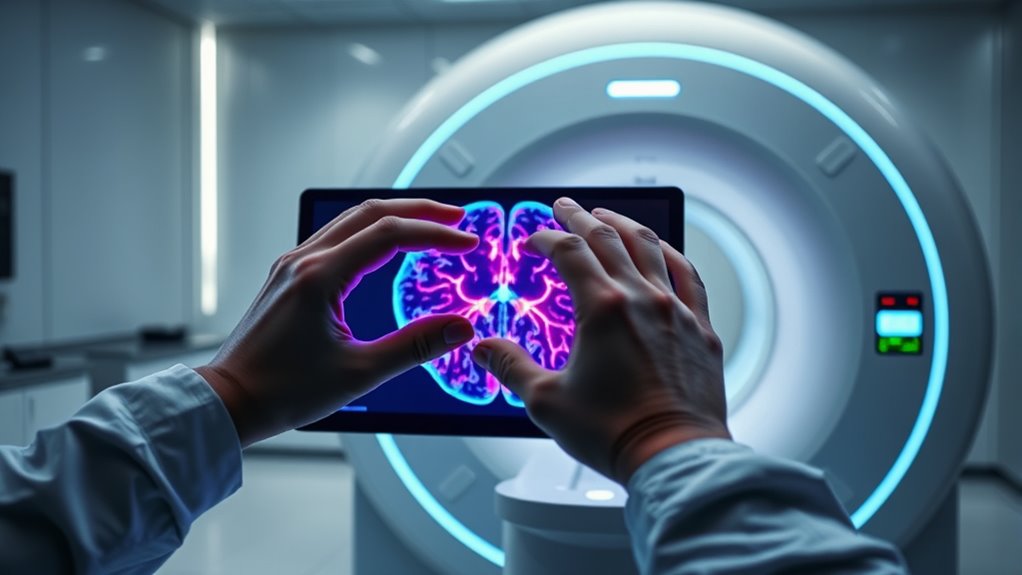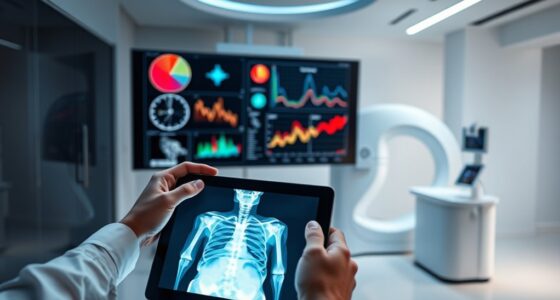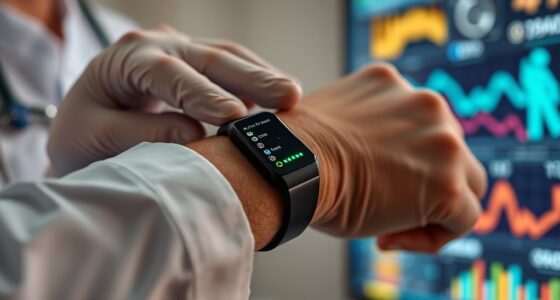Using advanced AI algorithms, your MRI scans can now reveal your brain’s true age and overall health. The technology analyzes subtle patterns in neuroimaging data, identifying biomarkers like gray matter volume and white matter integrity that indicate biological aging. This helps detect early signs of neurodegenerative risks and guides personalized health strategies. If you want to understand how this innovative approach can offer deeper insights into your brain health, keep exploring the possibilities.
Key Takeaways
- AI analyzes neuroimaging data to estimate your brain’s biological age, revealing if it’s aging faster or slower than your actual age.
- It detects biomarkers like gray matter loss and white matter changes to assess overall brain health and early signs of decline.
- The technology provides personalized insights, guiding lifestyle or medical interventions to slow aging and improve cognitive function.
- AI-driven MRI analysis supports early detection of neurodegenerative risks and enhances preventive strategies for brain health.
- Advanced imaging combined with AI improves accuracy in predicting brain health, enabling targeted treatments and ongoing monitoring.

Advancements in artificial intelligence now enable researchers to analyze your MRI scans and determine your brain’s true age and health. This breakthrough relies on sophisticated algorithms that interpret neuroimaging insights, offering a deeper understanding of how your brain ages over time. Instead of just looking at surface-level images, AI examines subtle patterns and markers within the scans, providing a detailed picture of your brain’s structural and functional health. These insights can reveal more than what traditional imaging can show, allowing for early detection of neurodegenerative conditions and other age-related changes.
One of the most significant contributions of AI in this field is its ability to identify aging biomarkers—specific features in your brain that correlate with biological age and overall health. These biomarkers include changes in gray matter volume, white matter integrity, and the presence of lesions or atrophy. By quantifying these markers, AI can generate an estimate of your brain’s actual age, which may differ from your chronological age. If your brain appears older than your actual age, it could signal underlying issues or increased risk for cognitive decline. Conversely, a younger-looking brain may suggest good neural resilience or effective lifestyle habits.
This technology enables you to gain personalized insights into your brain health. Instead of waiting for symptoms to appear, you can understand your neurobiological aging process in real time. If the analysis indicates accelerated aging, you might consider lifestyle modifications, such as improved diet, exercise, or cognitive training, to slow down or mitigate these changes. Healthcare providers can also use this data to tailor interventions and monitor the effectiveness of treatments aimed at preserving brain function.
Furthermore, these neuroimaging insights contribute to research by helping scientists better understand how various factors—like genetics, environment, and lifestyle—impact brain aging. Over time, this could lead to the development of more effective preventive strategies and therapies for neurodegenerative diseases. The precision that AI adds to MRI analysis makes it possible to detect early signs of decline long before symptoms manifest, opening new avenues for proactive brain health management. Additionally, incorporating high-resolution imaging techniques can further enhance the accuracy of brain age assessments and biomarker detection.
Frequently Asked Questions
How Accurate Is AI in Determining Brain Age Compared to Traditional Methods?
AI’s brain age estimation often surpasses traditional methods in diagnostic accuracy, providing a more precise view of your brain’s health. It analyzes complex MRI data quickly, identifying subtle changes that might be missed otherwise. While not perfect, AI offers a reliable tool for evaluating brain aging, helping you and your doctor make better-informed decisions. Overall, AI’s diagnostic accuracy in brain age estimation is improving, making it a valuable complement to conventional techniques.
Can This AI Analysis Predict Future Neurological Diseases?
Yes, this AI analysis can help predict future neurological diseases by analyzing your brain’s age alongside genetic markers and lifestyle factors. It identifies patterns indicating higher risks, allowing you to take preventive measures early. While it’s not a crystal ball, combining AI insights with your genetic and lifestyle data offers a more personalized risk assessment. This proactive approach can guide your decisions to maintain brain health over time.
Is the Mri-Based Brain Age Assessment Suitable for All Age Groups?
Ever wonder if this MRI-based brain age assessment suits everyone? It generally works well across age groups, but scan quality and specific age-related brain changes can affect accuracy. Younger people might have less detectable wear, while older adults’ scans need careful interpretation. So, is it suitable for all? Not quite, but with high-quality scans and tailored analysis, it’s increasingly useful for a broad age range.
How Does Lifestyle Affect the Ai’s Brain Health Predictions?
Your lifestyle impact critically influences the AI’s brain health predictions. A healthy diet influence, rich in nutrients, can support brain vitality, leading to a younger predicted brain age. Conversely, poor habits like smoking, excessive alcohol, and stress can accelerate aging signs. By maintaining exercise routines, balanced diets, and managing stress, you can positively affect your brain’s health, potentially improving AI assessments and promoting long-term cognitive well-being.
Are There Privacy Concerns Regarding AI Analysis of MRI Scans?
You’re right to worry; privacy concerns swirl like a storm around AI analysis of MRI scans. Data security must be airtight, shielding your personal health info from breaches. Ethical concerns also loom, questioning how your data’s used and shared. While AI offers insightful revelations, safeguarding your privacy is essential. You hold the key to ensuring your brain’s secrets stay protected, keeping the balance between innovation and your right to privacy.
Conclusion
By understanding your brain’s true age, you gain insight into your health and future. AI reveals your brain’s story, highlighting areas to improve and strengths to cherish. It’s a window into your mind, a mirror reflecting your wellness and potential. Embrace this knowledge, shape your habits, and nurture your brain. Because knowing your brain’s age is not just a number—it’s a call to care, to grow, and to thrive.











